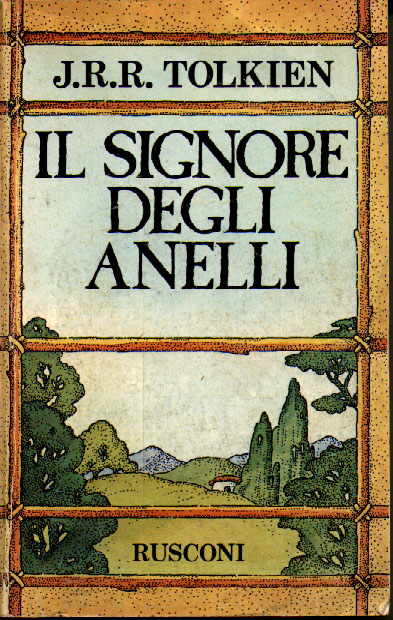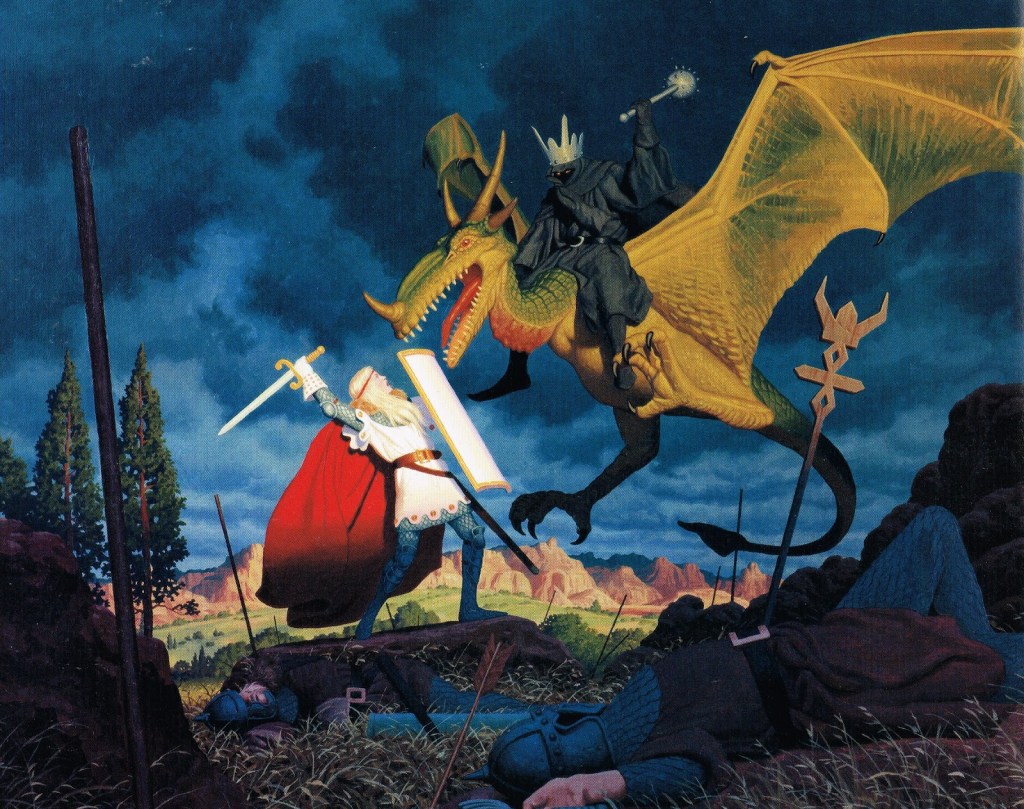I just found out my old paperback copy of Tolkien’s The Lord of the Rings, Italian edition published by Rusconi, which I bought in 1983 or 1984, goes for up to 150 bucks, second-hand, online.
I could give it a thought, really.

Apparently all the old editions of Tolkien’s doorstop novel are being called back and destroyed, or so it seems, as part of a complicated copyright infringement lawsuit that also branches out in a legal battle about slander and what not.
The crux of the problem: the current Italian publisher of Tolkien commissioned a new translation, and all hell broke loose. The old translation’s been accused of being inaccurate, the new translation’s been mocked for some choices and some have talked of twisting Tolkien’s word for the sake of political correctness. Then the current translator said the old translation featured “five hundred mistakes per page”, which was at least quite rude, and the old translator passed the thing to her lawyers.
It’s a mess, and the fans are going berserk.
In the meantime, the old versions are being pulped, or so it seems. Only the new translation will exist from now on.
But what really struck me in the whole thing was something that emerged from the debate: some fans said the novel should have been translated by a Tolkien fan, and by someone with a familiarity with fantasy.
But other have pointed out that The Lord of the Rings
is not fantasy
And my first reaction was, what the heck, with all those elves and orcs, wizards and a fricking magical ring and all the rest, you could have fooled me.

But apparently, part of the debate is on whether or not Tolkien’s world is “serious literature” – and “obviously” serious literature has nothing to do with fantasy, and fantasy cannot be serious literature.
Which is poppycock, of course, but is also the standard position of literary critics and academia hereabouts – and mind you, it was not always so: I remember a time when literature was literature, serious or otherwise, and fantasy was treated as any other form of narrative.
Now, anyone with at least a superficial acquaintance with the genre knows that serious issues can be tackled in fantasy as in realistic contemporary mainstream fiction – indeed, fantasy is often better at tackling some specific themes (and the same goes for science fiction, horror, mystery or what-have-you, of course).
And this leads to a very hairy question – what makes “fantasy”, fantasy, and “serious literature”, serious literature? And are these secret ingredients mutually exclusive?
Also, who decides what a novel is, or is not?
I remember an interview with Gene Wolfe, that when asked what genre did he write, responded he wrote the genre that the guy who stocked the books in the wireframe display in the store decided.
If the place my books by Asimov’s, I write science fiction.
And anyway, it looks like in my country we are once again being pulled apart by two opposite forces – on one side, there are those that would like fantasy to be as childish, vulgar and lowest-common-denominator as possible, and on the other those that “yes, it looks like fantasy but actually…”
And in the middle of all of this, here I stand: anyone interested in a second-hand copy of The Lord of The rings?

24 January 2020 at 00:01
I second that poppycock!
LikeLiked by 1 person
24 January 2020 at 10:03
You should keep your copy for selling it to collectors: in a few years it might be worth it 😀
The current translator also clarified that “five hundred mistakes per page” was a hyperbole, told within a context in which he actually also recognized the hard and good work of a young translator. and I feel the reaction which led to the withdrawal being a bit of an overreaction, and that the old versions being pulped would be a loss anyway. It reminded me of Indiana Jones in Berlin. Although I understand the feeling of having translation rights not paid.
I also feel all this mess is a very well played marketing campaign, but I actually decided I’ll just enjoy the new translation as a fresh look on an old book I liked. It’s not that bad, having people discussing over the interpretations of a book who actually got a treatment it did not deserve in the past. You just have to keep the fanatics at bay.
And it’s not that bad too trying to get the fantasy out of the fantasy shelves: I dream of the beatiful day in which tags on the shelves will disappear, and we’ll be able to focus on stories. I think this whole mess might play a part in the process of getting “genre fiction” its well deserved place in the “fiction” shelves.
LikeLike
24 January 2020 at 11:15
It is certainly just a marketing campaign based on indignation and outrage – and it is offensive to the intelligence of the readers.
As for trascending genre labels, OK, why not, but then how do I go in abookstore and ask for a mystery?
A book in which someone is killed?
A book about investigations?
Labels are useful – it’s up to us not turn them into cages.
LikeLike
24 January 2020 at 12:48
Indeed, I was dreaming of the beatiful day in which tags on the shelves will disappear. I still want to go in a bookstore and ask for a mistery, but I’d also like to go in a bookstore without cages in which misteries, fantasy or SF are kept from contaminating the Real Literature Books. I’d also like stumbling upon a mistery, a fantasy, a whatever by chance, just reading the back cover and being intrigued.
But IRL bookstores are closing, I only find stuff I like on the web, I have to rely upon my pushers, and we’re probably all doomed. Now that I think about it, even the LOTR-shift will probably be just moving from Fantasy shelf to Classics shelf: another cage in the bookstore.
I was just daydreaming about a world in which labels are back being something useful, and not a patch on the sleeve (as for Indiana Jones from my previous comment, I still got Nazis on my mind, but that’s another hyperbole 🙂 ).
LikeLike
24 January 2020 at 13:34
The fact that some benighted individuals see labels as cages does not mean we must do the same. Their attitude is proof of their bias, but we do not have to share such a bias ourselves.
LikeLike
24 January 2020 at 13:58
I agree, there’s alway a way out for those who want it. my point is that such individuals affect publishers choices, leaving a lot of stuff out from their smaller cages. still, there’s a way out: don’t stick to labels, get good pushers, try other languages, lockpick the cage door… but it’s never an easy way.
LikeLike
24 January 2020 at 11:35
As an aside, given the original translator’s tendency to sue whoever touches this topic, let’s be careful about what we say, and how 😉
LikeLiked by 1 person
24 January 2020 at 12:33
ok, this sounds scary 😀
LikeLike
24 January 2020 at 13:32
It is scary, because for the Italian law, I am responsible for what my readers write in the comments 😀
LikeLike
24 January 2020 at 15:22
The last time I heard of this subject it was that, apparently, Tolkien has never written fantasy fiction because in his conception of its literary work he was, simply, the translator of an historical chronicle of our past.
LikeLike
Pingback: Sensor Sweep: Genre Magazines, Mort Kunstler, Vampire Queen, Boris Dolgov – Herman Watts
Pingback: Sensor Sweep: Genre Magazines, Mort Kunstler, Vampire Queen, Boris Dolgov – castaliahouse.com